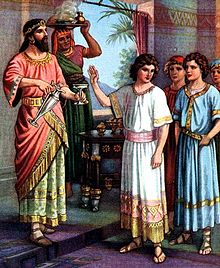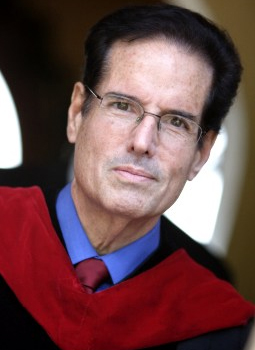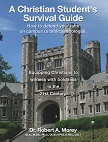Alcoholic Beverages in the Bible
By: Dr. Robert A. Morey
Audio topic: Alcoholic Beverages & the Bible
Alcoholic Beverages--Side A
Alcoholic Beverages--Side B

Prince/Prophet Daniel (605 BC to 532 BC; Judah's elite taken into captivity--see Daniel 1:1-6) refusing the Kings Food (Daniel 1:8). The complete Babylonian captivity of the House of Judah took place in 586 BC-- see 2 Kings 25), 1900s illustration (left). The House of Israel was taken captive by the Assyrian Empire (722 BC)--see I Chronicles 5:26.
There are true Christian believers that adhere to food laws in the "Mosaic Covenant" (there are 4 Covenants in the Old Testament) even though it is not required under the "New Covenant"; this could be for various reasons such as some do not understand the liberty they have under the "New Covenant" or they just choose not to eat certain foods (personal preference, cultural background or it violates their conscience)---however, Christians (including Pastors) are not authorized per Bible to tell other Christians what they can eat or drink (Alcoholic Beverages) -- see Colossians 2:16 & Romans 14.
Article: Alcoholic Beverages & the Bible by Dr. Robert A. Morey
One of the unique aspects of American Christianity is the doctrine of total abstinence from all alcoholic beverages. This doctrine was never part of the history of the Christian Church in the East or in the West. It was unheard of in Europe, the Middle East, the Orient, and Latin America until American missionaries arrived.
Historically, it arose during the beginning of the twentieth century in sympathy with Carry Nation’s movement to add an 18th Amendment to the Constitution prohibiting alcoholic beverages. Dr. Machen and many other fundamental Christian leaders condemned prohibition and the 18th Amendment on the grounds that such things were in conflict with Scripture and would result in more drunkenness than ever. Their dire warnings came true and the 18th Amendment was eventually repealed because of all the pain, suffering, alcoholism and crime it produced.
The following Bible facts should be taken into account when dealing with this issue:
1. “Wine” is mentioned 260 times in the Bible and “strong drink” is mentioned 21 times. In the Hebrew and in the Greek, “wine” refers to fermented grape juice and “strong drink” refers to the alcohol fermented from fruits and grains and is called “beer” or “hard liquor” today.
2. The drinking of alcohol was universal except for certain priests. Abraham and Melchizedek (Gen. 14:18), Isaac (Gen. 27:25), Jacob (Gen. 27:28), Boaz (Ruth 3:7), a Levi (Jud. 19:19), Paul and Timothy (I Tim. 5:23), and even Jesus (Lk. 7:33-34) drank wine.
3. Both wine and strong drink were used in the worship of God (Gen. 14:28; Exo. 29:39-40; Deut. 14:26; Num. 28:7). If they were “the devil’s brew” or “demon rum,” God would have never commanded them to be part of worship.
4. They are viewed as the blessing of God in the Bible (Gen. 27:28; Psa. 104:15; Pro. 3:9-10; Isa. 55:1-2; Ecc. 10:19; Zech. 10:7).
5. Jesus not only drank wine but He even made it for others (John 2:1-11 cf. 4:46).
6. A little wine with your meal is viewed as good for your health (I Tim. 5:23).
7. Both strong drink and wine were used for mental health (Pro. 31:6-7).
8. The wise woman prepares wine for a meal (Pro. 9:1-5).
9. The Bible clearly condemns drunkenness and addiction to alcohol (Pro. 20:1; 23:29-35; I Tim. 3:3, 8; Tit. 1:7; 2:3; Eph. 5:18).
10. Paul tells believers not to let anyone judge them about what they eat or drink (Col. 2:16). In other words, if a weaker brother tries to lord it over your conscience, don’t let him to do it.
11. In Rom. 14, the “strong brother” is the one whose conscience has been educated by the Word of God so that he may eat and drink what he wants. The “weak brother” has an uneducated conscience so he feels guilty about a lot things which God never condemned in His Word.
12. Paul tells the strong in the faith to bear with the foolishness of the weaker brethren. (Rom. 15:1).
13. Thus the strong must never force the weak in the faith to violate their conscience. Thus if a weaker brother feels that eating meat, drinking wine, going to the movies, etc., violates his conscience, tell him to follow his conscience. (Rom. 14).
14. This does not give the weak the right to lord it over the strong. Paul forbids anyone to judge others on such issues as food and drink (Col. 2:16).
15. When in the presence of the weak, the strong should not do those things which would tempt the weak to violate their conscience. (Rom. 14).
16. But when the strong are not in the presence of the weak, they are free to do as their conscience dictates. Thus the strong may eat and drink what he wants in his own home or in the presence of the strong.
17. “There is no direct or absolute prohibition of the use of wine in the N.T. The moderate and appropriate use of wine is recommended to Timothy by Paul.” (Zondervan Pictorial Encyclopedia of the Bible, Vol. 5, p. 936).






































